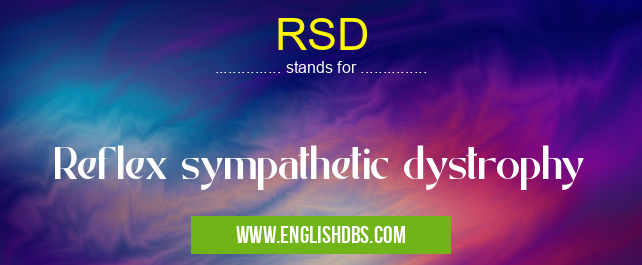What does RSD mean in MEDICAL
Reflex Sympathetic Dystrophy (RSD) is a medical condition that affects the nerves, caused by a dysfunction of the sympathetic nervous system. It has multiple symptoms including pain, burning sensations, cold and coldness in affected areas, changes in skin color and temperature, swelling, extreme sensitivity to touch, muscle spasms and difficulties with movement. RSD is most commonly seen in the hands, feet and lower legs but can affect any area of the body.

RSD meaning in Medical in Medical
RSD mostly used in an acronym Medical in Category Medical that means Reflex sympathetic dystrophy
Shorthand: RSD,
Full Form: Reflex sympathetic dystrophy
For more information of "Reflex sympathetic dystrophy", see the section below.
Symptoms
RSD is characterised by many different painful symptoms which can vary from person to person. Symptoms may include intense burning pain which may be triggered by even slight movements or pressure; fatigue; changes in skin colour such as redness or paleness; changes in skin temperature – feeling either hot or cold to touch; swelling; muscle spasms and difficulty moving the affected limbs. In some cases people also report sensory disturbances such as numbness or hyper-sensitivity to light touch.
Causes
The exact cause of RSD remains unclear however certain events are known to trigger it including traumatic injuries like fractures or sprains, surgery – particularly on the hand or arm – nerve damage due to an infection or disease such as diabetes, exposure to certain chemicals or medications and stroke. In some cases there appears to be no underlying cause for the development of RSD.
Diagnosis
Diagnosis of RSD usually starts with a physical examination followed by tests such as X-rays, MRIs and nerve conduction studies. Patients may also have blood tests which help rule out other conditions such as diabetes which can share similar symptoms. Treatment for RSD typically utilises a combination of medications for pain relief along with physical therapy and lifestyle modifications such as avoiding activities that worsen the pain flares.
Essential Questions and Answers on Reflex sympathetic dystrophy in "MEDICAL»MEDICAL"
What is RSD?
Reflex Sympathetic Dystrophy (RSD) is a chronic neurological disorder that causes severe burning pain, usually in the arms or legs. It can also cause skin and tissue changes such as extreme sensitivity to touch, muscle stiffening, and joint contracture.
What are the symptoms of RSD?
The most common symptom of RSD is intense burning pain which can range from mild to excruciating. Other symptoms may include difficulty with movement of the affected limb(s), discoloration of the skin, excessive sweating, swelling or tenderness in the affected area, and stiffness or tightness in muscles.
How does RSD impact people's lives?
People with RSD often experience difficulty completing everyday tasks due to their physical symptoms. Pain can be so severe that it interferes with sleep, mobility, and everyday activities such as preparing meals and doing laundry. People may also experience psychological effects such as anxiety, depression and feelings of hopelessness due to the chronic nature of their condition.
Is there any cure for RSD?
Currently there is no known cure for RSD but there are treatment options available to help reduce its symptoms. These treatments can include medications such as pain relievers and antidepressants, physical therapy interventions including stretching exercises and massage therapy, nerve blocks or surgery in some cases, and psychological support such as cognitive-behavioral therapy (CBT).
Does stress worsen the symptoms of RSD?
Stressful events can exacerbate symptoms associated with RSD, mainly because stress activates hormones that further sensitize regions of the brain responsible for processing pain signals. This leads to an increased sensation of pain in people who have already been diagnosed with this condition. Therefore reducing stress through participation in activities such as yoga or meditation may provide some relief from symptoms associated with this disorder.
Should I see a doctor if I think I have RSD?
Yes! It is important to seek medical attention if you believe you may have developed this condition so that your doctor can perform a physical examination and order diagnostic tests like X-rays or MRI scans to determine an accurate diagnosis. Once your doctor has diagnosed you accurately then he/she can provide you appropriate treatment options tailored to your individual needs.
Can lifestyle changes help manage the symptoms associated with RSD?
While lifestyle modifications alone cannot treat this condition they may help alleviate some of its accompanying discomfort by promoting relaxation techniques such as deep breathing exercises or mindfulness practices which help reduce anxiety levels associated with RSD symptoms like pain or fatigue. Eating a healthy diet rich in fiber supplemented by regular exercise routines have also been found beneficial for managing this condition overtime.
Are there any assistive devices available for people living with RSD?
There are several assistive devices available on the market today that aid people living with RSD in performing basic tasks around their homes more conveniently without causing them any further discomfort or immobility related issues due to this condition . These devices include specialized wheelchairs designed specifically for greater comfort during travel alongside other ergonomic products like raised toilet seats or shower chairs designed especially keeping individuals suffering from chronic conditions like Reflex Sympathetic Dystrophy in mind.
Final Words:
Roughly 10 million people across the world suffer from Reflex Sympathetic Dystrophy (RSD). Although its cause is unknown it has been linked to various triggers including traumatic injuries or exposures to certain chemicals. Symptoms vary but often include intense burning pain accompanied by swelling and changes in skin colour and texture. A diagnosis usually involves physical examination followed by X-rays, MRIs and nerve conduction studies before treatment begins using a combination of medications along with lifestyle modifications aimed at reducing flare ups with activity that aggravates pain.
